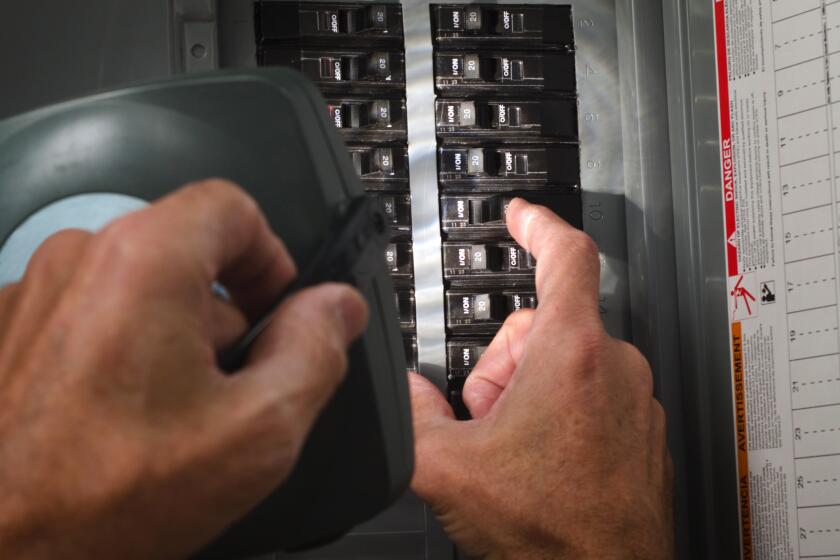New Child Support Law Under Attack : Families: A spate of bills address fathers’ complaints that sharply higher payments are driving them to poverty. But the measure’s backers hold firm, saying children are now getting their due.
As legislative battles go around here, this one has the deep divisions of a divorce. And no wonder: The aftermath of divorce is what it’s all about.
Less than a year after a new state law boosted child support payments borne largely by divorced fathers, the Capitol is being flooded with the complaints of outraged dads from Orange County to Eureka.
Although the law has been praised by women’s rights groups and divorced mothers struggling to make ends meet, a growing contingent composed mostly of fathers and their new spouses contends that the inflated payments are ruining their standard of living. Some say they have been shoved precariously close to poverty.
“The whole thing has just been pushed too far,” said Linda Riley, Orange County chapter president of Coalition of Parent Support, a statewide group that formed to fight the changes. “We’re not talking here about people who have boats and Rolls-Royces. We’re talking about people who make it from paycheck to paycheck.”
Buffeted by complaints, the Legislature has introduced a spate of bills that could ease some of the pain fathers are feeling from the new child support guidelines, which went into effect last July. The new rules were designed to raise payments an average of 25%, but in some cases they have doubled or tripled.
Boosters of the new child support rules, meanwhile, have begun to dig in their heels. They note that divorced women with children are the largest poverty group in the nation. Child support critics, they argue, exaggerate the severity of the financial burden and largely ignore the reason for the boosted payments--to improve the lot of their own children.
“Many absent parents pay more in monthly car payments than they do in child support,” said Wayne D. Doss, director of the Los Angeles County district attorney’s bureau of family support. “As expensive as cars are, there’s something wrong when someone thinks they should spend more money on a set of wheels than their own flesh and blood.”
On some key issues, the two sides appear to have irreconcilable differences.
Advocates of the new obligations contend that the average child support payment in California was among the lowest in the nation before the new rules. It now is in the top 10, they say, right where it should have been all along in a state where the basic necessities of life are costly. But critics say California ranked 10th for child-support payments before the changes; with the new provisions in place it’s at the top of the pack, averaging $1,154 per month.
Behind the numbers debate is the human rift. Consider the case of Grey vs. Grey.
The Orange County couple got divorced in 1990 after 18 years of marriage and four children. Last summer, the new law boosted Mel Grey’s child support payments by 50%. The result, he says, has been disastrous: bankruptcy, crumpled credit, foreclosure on his home in Rancho Santa Margarita.
“I think the new law is absurd and out of line,” he said. “This is a devastating nightmare. It has wiped me out emotionally and financially. I don’t have a life.”
Grey’s ex-wife, Jane, has a decidedly different story. A homemaker for years before the divorce, she got a clerical job that yields $2,000 a month. Life was a struggle, even with the extra $900 she got each month from her husband in support payments.
When the payments were raised last summer, she began getting $1,350 each month--and the additional cash has made a difference.
“This isn’t a meal ticket,” she said. “The new law is plenty fair to him. I have more debts than he does and I have to support five people.”
Under the state’s new child support formula, a non-custodial parent with one child pays about a quarter of his or her monthly net income as support, with the amount increasing for every additional child. A non-custodial father with four children, for instance, could have to pay more than 55% of his net monthly income in child support.
Some fathers have seen their payments skyrocket, often because the original payment was set at a low level years before. Increases can also be affected by changes in income, child care payments, medical insurance and the salary of a second spouse. The new rules most severely affect low-wage earners and divorced parents of large families.
Although advocates of the new support guidelines think parity between divorced parents has finally been achieved, they do not discount the plight of fathers who bought into a lifestyle after divorce and then abruptly saw their child-support payments jump.
“Lots of people did things like buy houses based on their financial situation before the new guidelines were in place,” said Drew Liebert, legislative aide to state Sen. Gary K. Hart (D-Santa Barbara), who authored the bill that raised the payments. “We’re sympathetic to what they’re going through.”
Some legislators have already taken steps to ease the burden. Assemblyman Trice Harvey (R-Bakersfield) is sponsoring a bill that would phase in child-support increases gradually so non-custodial parents are not pushed into the poorhouse.
Another bill winding through the legislative process is a proposal by Sen. Charles M. Calderon (D-Whittier) that would rescind a longstanding rule that the salary of a new spouse be factored in when child support payments are calculated.
Orange County’s Riley contends that the inflated payments are blatantly gender-biased. If the tables were turned and the dominant breadwinners in divorce cases were women instead of men, the rules for child support payments would be far different, she said.
“So much money has been taken away from one parent, there’s just no fairness in this,” Riley said. “They’ve swung the pendulum from one end to the opposite end.”
A chief gripe is that there is no accountability for what divorced mothers do with the child support payments. Disgruntled fathers tell horror stories of mothers who have used the money to buy jewelry or pay for cosmetic surgery rather than spending it on their children.
These fathers also chafe at the notion that they are “deadbeat dads.” They have religiously made their support payments. They have tried to stay in touch with the children. But now they feel singled out. “They’re treating these non-custodial dads like deadbeats or criminals,” groused Riley.
Opponents note that divorced mothers have been pleading for years for a boost in child support. The fathers, they say, need to accept that divorce is hard on the pocketbook. It’s a matter of simple mathematics: The economic pie that once supported one household now has been divided in two.
“When families break up, we’re talking about sharing the poverty,” Doss said.
Times staff writer Davan Maharaj contributed to this story.
More to Read
Sign up for Essential California
The most important California stories and recommendations in your inbox every morning.
You may occasionally receive promotional content from the Los Angeles Times.






